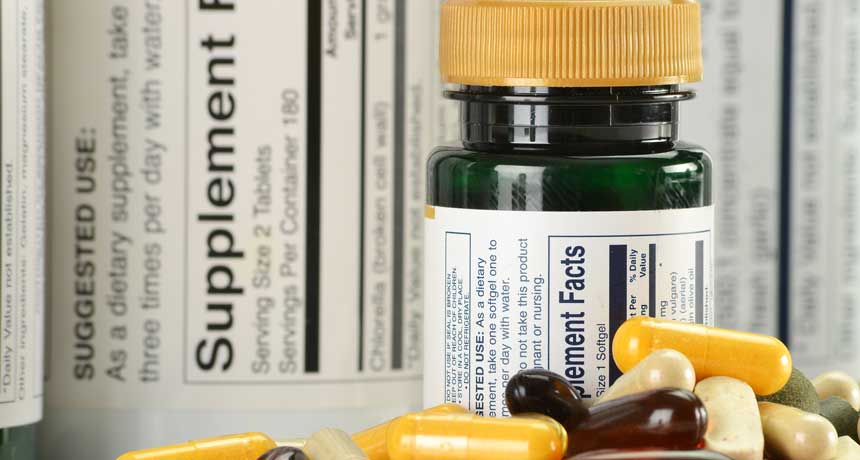Many food supplements unlawfully contain drugs
Manufacturers removed fewer than half of the offending products from store shelves

Of nearly 800 dietary supplements that the FDA found tainted with potentially harmful drugs, most were normally prescribed by doctors to aid male sexual “enhancement,” weight loss or muscle-building.
Monticello/iStockphoto
Between 2007 and 2016, the U.S. government identified nearly 800 food supplements that were contaminated with drugs. That’s the finding of a new study. Especially disturbing: Most of these tainted products were never removed from store shelves.
Food supplements include vitamins and minerals. They also include many products that make health-promoting claims. These might be capsules of supposedly heart-healthy fish oil. Other supplements (such as chondroitin) claim to aid sore joints. Capsules of powdered cinnamon claim to help improve blood sugar levels. More than half of American adults say they take dietary vitamins and other supplements.
The Food and Drug Administration, or FDA, regulates these products. It allows them to contain only foods and food-like ingredients. Drugs, such as muscle-building steroids, are not permitted. In all, an estimated 85,000 food supplements are sold in the United States that claim to help boost health in some way. That’s too many, FDA says, for the agency to test them all.
But FDA has logged reports on supplements that have been found to contain potentially harmful things. Prescription drugs would qualify. FDA’s database of those reports is open to the public. Researchers working in Sacramento for the California state government analyzed reports in that database. They focused on the drug contaminants found. They also looked at what the health claims were that companies had made about each supplement that had been tainted.
Ads for most of the products had promised help with weight loss, muscle building or Viagra-like male sexual enhancement. Jenna Tucker with California’s Department of Food and Agriculture and her colleagues reported their findings online October 12 in JAMA Network Open.
Food supplements are not tested or regulated in the same way that prescription drugs are. But if FDA learns of tainted supplements, it can issue public warnings. It also can suggest that supplement-makers recall — take back — those products from stores.
That approach raises questions, says Pieter Cohen. He works at Cambridge Health Alliance in Cambridge, Mass. A doctor of internal medicine, Cohen was not involved in the new study. Voluntary recalls don’t necessarily lead to a complete removal of an offending product from store shelves, his research has shown. What’s more, people may never learn about a products’ tainting so that they can decide to stop using it.
The new study turned up 776 supplements in the FDA database that were reported to have been contaminated with a drug. Of these, fewer than half were recalled, the study found. “What really jumped out at me,” Cohen says, is that “when the FDA detects drugs in supplements, more than half the time the product isn’t even recalled.”
Even without contaminants, supplements can pose health risks.
One 2015 study estimated that 23,000 people visit U.S. hospital emergency rooms each year for health problems triggered by food supplements. Almost one in every 10 affected patients was admitted to the hospital. Often they had symptoms related to heart trouble.
Liver damage can be fatal or require a liver transplant. And a 2013 report by the U.S. Centers for Disease Control and Prevention probed the likely cause of 29 cases of liver damage. All but five of these people had taken a food supplement for weight loss.
“The law allows companies to advertise supplements as if they’re good for your health, even if there’s no evidence in humans that that’s the case,” Cohen says. He started studying food supplements after noting that some of his patients who used them for weight loss developed health problems. Their symptoms included panic attacks, chest pain and kidney failure. One patient was suspended from his job when a drug test turned up what appeared to be amphetamine in his urine. The chemical was a breakdown product of the drug that tainted the weight-loss pills he had been taking.
Cohen’s recommendation? Avoid supplements “that promise you anything.”







